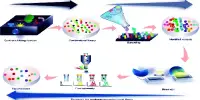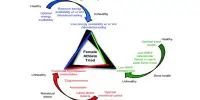Restricting calories is recognized to promote health and lengthen lifespan, but much of how it does so is unknown, particularly how it protects the brain. Buck scientists discovered a role for a gene named OXR1, which is required for the lifespan extension observed with dietary restriction as well as for healthy brain aging.
“When people restrict their food intake, they typically think about how it affects their digestive tract or fat buildup, but not necessarily how it affects the brain,” said Kenneth Wilson, Ph.D., Buck postdoc and first author of the study, which was published online in Nature Communications. “As it turns out, this is a gene that is important in the brain.”
The researchers also showed a comprehensive molecular mechanism for how dietary restriction can delay aging and reduce the evolution of neurodegenerative disorders. The study, conducted in fruit flies and human cells, also identified potential treatment targets for slowing aging and age-related neurodegenerative disorders.
We found a neuron-specific response that mediates the neuroprotection of dietary restriction. Strategies such as intermittent fasting or caloric restriction, which limit nutrients, may enhance levels of this gene to mediate its protective effects.
Professor Pankaj Kapahi
“We found a neuron-specific response that mediates the neuroprotection of dietary restriction,” stated Buck Professor Pankaj Kapahi, Ph.D., the study’s co-senior author. “Strategies such as intermittent fasting or caloric restriction, which limit nutrients, may enhance levels of this gene to mediate its protective effects.”
“The gene is an important brain resilience factor protecting against aging and neurological diseases,” said Buck Professor Lisa Ellerby, Ph.D., co-senior author of the study.
Understanding variability in response to dietary restriction
Members of the research have previously demonstrated pathways that extend lifespan and healthspan with dietary restriction, but there is so much variety in response to lower calories among individuals and tissues that it is evident that many more processes remain to be uncovered. This experiment began in order to better understand why different people respond differently to diets.
The researchers began by scanning over 200 types of flies from various genetic backgrounds. The flies were reared on two alternative diets: a regular diet and a dietary limitation of only 10% of normal nutrition. Researchers found five genes with unique variations that had a substantial effect on longevity under dietary restriction. Two of those had human genetic equivalents.

The team chose one gene to explore thoroughly, called “mustard” (mtd) in fruit flies and “Oxidation Resistance 1” (OXR1) in humans and mice. The gene protects cells from oxidative damage, but the mechanism for how this gene functions was unclear. The loss of OXR1 in humans results in severe neurological defects and premature death. In mice, extra OXR1 improves survival in a model of amyotrophic lateral sclerosis (ALS).
The link between brain aging, neurodegeneration and lifespan
The researchers conducted a series of in-depth tests to determine how an activated gene in neurons influences total lifetime. They discovered that OXR1 affects the retromer complex, which is a collection of proteins required for the recycling of cellular proteins and lipids. “The retromer is an important mechanism in neurons because it determines the fate of all proteins that are brought into the cell,” Wilson added. Retromer malfunction has been linked to age-related neurodegenerative disorders that can be prevented by food restriction, notably Alzheimer’s and Parkinson’s diseases.
Overall, their results told the story of how dietary restriction slows brain aging by the action of mtd/OXR1 in maintaining the retromer. “This work shows that the retromer pathway, which is involved in reusing cellular proteins, has a key role in protecting neurons when nutrients are limited,” said Kapahi. The team found that mtd/OXR1 preserves retromer function and is necessary for neuronal function, healthy brain aging, and lifespan extension seen with dietary restriction.
“Diet influences this gene. By eating less, you are actually improving the mechanism of proteins being properly sorted in your cells, because your cells are increasing the expression of OXR1,” Wilson explained.
The study also discovered that increasing mtd in flies lets them live longer, leading researchers to postulate that in humans, overexpression of OXR1 may help lengthen lifespan. “Our next step is to identify specific compounds that increase the levels of OXR1 during aging to delay brain aging,” Ellerby went on to say.
“Hopefully from this, we can get more of an idea of why our brains degenerate in the first place,” Wilson added. “Diet affects all processes in your body,” he stated. “I think this work supports efforts to follow a healthy diet because what you eat is going to affect more than you know.”













